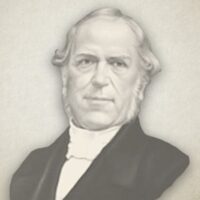
21 Did The Lord Take Opportunities To Preach Duty Faith And Universal Invitations?
If duty faith and universal invitations unto salvation were really truths of the divine mind, and of revelation, they would claim a place in the gospel ministry as first principles, and would have been held by our Lord and his apostles as of so much importance, as, for that reason and for our example, to have used them on every fair occasion, and not let one real opportunity escape the enforcing of them upon unbelieving persons. And did they do so? And have they set us any such an example? No, but altogether the contrary, as the following examples of their conduct will shew: `Then charged he his disciples that they should tell no man that he was the Christ,’ Matt xvi 20. On duty faith and universal invitation principles, we should suppose that all men would have been invited to come, that through seeing they might all believe, not missing such a fine opportunity, if duty faith and universal invitations had ever been in the Lord’s meaning; but instead of which it was `tell no man’ to come and see.
And when our Lord talked with the woman of Samaria, he neither told her that it was her duty to believe unto salvation nor invited her to do so, but pointed at her conscience through the medium of her rationality, saying, `If thou knewest the gift of God, and who it is that saith to thee, give me to drink; thou wouldest have asked of him, and he would have given thee living water,’ John iv 10. Here our Lord preached a cluster of truths in few words to this unconverted woman, and that without any contradiction to other truths, or jar with the free and sovereign grace counsels of God; and also without telling her that it was her duty to believe unto salvation, or inviting her to do so; but it was a shewing of her, that if she were convinced of the truth and knew what was true, she would pray; and that if she were a praying person she should obtain, as all praying souls shall and do obtain, the blessings prayed for. `Jesus saith unto her, Go, call thy husband and come hither,’ verse 16. This was neither duty faith nor universal invitations to salvation; but a home appeal to her conscience, through the medium of her conduct in life; for Jesus knew that she had no husband, verse 17, and an honest statement of God’s truth will find out all such things by the power of the Holy Ghost, without the minister’s even knowing the person; whilst duty faith and universal invitations neither detect nor destroy them, but cover them over, and deceive the soul with a false piety. And our Lord further said, ‘Ye worship ye know not what,’ verse 22. This was an appeal to her conscience through the blindness of her devotion; while true worship must embrace in it a knowledge of God who is worshipped, and the heart engaged accordingly. If we want to know how to address sinners in the name of the Lord, here is an example which cannot be excelled, an example which needs no reconciling with the counsels of God, an example that is in harmony with all the particular truths of free, sovereign, and absolute grace, an example from the spirit of which we have no warrant to deviate in the ministration of the gospel of the grace of God.
When the Jews were on one occasion disputing with our Lord about his being the Christ, he said unto them, ‘Ye believe not, because ye are not my sheep, as I said unto you,’ John 10:26. Sometimes our Lord spoke to the Jews in a manner peculiar to them in relation to the covenant under which they were, as we have before hinted, and shall make some further observations upon before we close these remarks; while at other times he spoke to them on things immediately relating to external salvation; and then it was in a manner agreeing with every special doctrine of the gospel of salvation, as is the fact in our text, in which our Lord did not tell them it was their duty to make themselves sheep, and then to believe in him as such; nor did he tell them it was their duty to believe, and so become his sheep; but plainly told them that their state was that which bore no mark of a sheep, and so no mark for eternal life; chewing, also, that God and not man, grace and not human duties or works, are first in a soul’s belief unto salvation; striking, also, at the pharisaical pride of man, which strove then as it does now, to place human works and duties first in the order of action to salvation interest with God.
John Foreman (1792-1872) was a Strict and Particular Baptist preacher. He was appointed the Pastor of Hill Street Chapel, Marylebone, serving this position for close to forty years.
JOHN FOREMAN'S LIFE AND MINISTRY
JOHN FOREMAN ON DUTY FAITH (COMPLETE)
JOHN FOREMAN'S BAPTISM AND COMMUNION CONSIDERED (COMPLETE)




